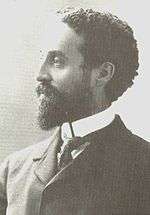Horatio Dresser
Horatio Willis Dresser (1866–1954) was a New Thought religious leader and author in the United States. In 1919 he became a minister of General Convention of the Church of the New Jerusalem, and served briefly at a Swedenborgian church in Portland, Maine.
Horatio W. Dresser | |
|---|---|
 | |
| Born | January 15, 1866 |
| Died | March 30, 1954 Boston, Massachusetts |
| Nationality | American |
| Occupation | Minister, author |
| Known for | Author of New Thought |
| Parent(s) | Julius A. Dresser and Annetta Seabury Dresser |
In addition to his writings on New Thought, Dresser is known for having edited two books of selected papers by Phineas Parkhurst Quimby. Both of Dresser's parents had studied with the mesmerist, who influenced the New Thought movement.
Early life
Dresser was born January 15, 1866 in Yarmouth, Maine to Julius and Annetta Seabury Dresser. His parents were involved in the early New Thought movement through their being treated by and then studying with Phineas Parkhurst Quimby. They became his early disciples, as did Mary Baker Eddy.[1]
When Dresser was a youth, his father was embroiled in a controversy with Eddy, the founder of Christian Science. His father accused Eddy of stealing Quimby's concepts and using them as a basis for her system of Christian Science.[2] But other scholars have noted the differences between the systems, as Eddy's was religiously based.
After attending local schools, Horatio Dresser was admitted to Harvard in 1891. He dropped out in 1893 upon the death of his father. Ten years later he returned to Harvard, completing his Ph.D. in 1907.[2]
New Thought
In 1895, Dresser became involved with the Metaphysical Club of Boston, a group which he later referred to as the "first permanent New Thought club".[3] That same year, Dresser published his first book, The Power of Silence. In 1896, Dresser founded the Journal of Practical Metaphysics. Two years later, this journal was merged into The Arena, for which Dresser was subsequently an associate editor. The following year, 1899, Dresser founded another New Thought magazine, The Higher Law. He was a past president of the International New Thought Alliance.
He started lecturing about New Thought, speaking to audiences in major cities throughout the country. In 1900 the Atlanta Constitution described him in the following terms:
Tall and slender, with a finely modeled head, which is poised on a magnificent pair of shoulders; his general athletic appearance indicates something more than mere student ... His delivery is plain, straightforward, and unadorned with the flowers of rhetoric.[4]
Dresser taught at Ursinus College in Philadelphia, Pennsylvania from 1911-1913. In 1919, he became a minister of the General Convention of the Church of the New Jerusalem, a denomination built around the teachings of Emanuel Swedenborg, briefly serving as a pastor of a Swedenborgian church in Portland, Maine.
Controversy
In 1921, after the Library of Congress made Quimby's papers publicly available, Dresser compiled and edited a selection of Quimby's works, The Quimby Manuscripts (1921). In this work, Dresser re-opened the controversy concerning Quimby and Mary Baker Eddy, and her sources for developing Christian Science. He attacked Eddy in a chapter as well as in the appendix of the book; saying, for example:
1885. Mrs. Eddy collects her "facts" in "Historical Sketch of Metaphysical Healing" ... tries to show that Quimby was a mere mesmerist: alleges that she left [manuscripts] with him in 1862.[5]
Personal life
Dresser married Alice Mae Reed in 1898.
He died March 30, 1954 in Boston, Massachusetts.[2]
Bibliography
- The Power of Silence, 1895.
- Education and the Philosophical Ideal, 1900.
- A Book of Secrets with Studies in the Art of Self Control, 1907.
- A Physician to the Soul, 1908.
- A History of the New Thought Movement, 1919.
- The Quimby Manuscripts, 1921.
- A History of Ancient and Medieval Philosophy, Thomas Y. Crowell Company, 1926.
- Outlines of the Psychology of Religion, Thomas Y. Crowell Company, 1929.
References
- Robert D. Richardson, William James: In the Maelstrom of American Modernism, Boston and New York: Houghton Mifflin Harcourt, 2006, 275-276.
- "Horatio Willis Dresser." Religious Leaders of America, 2nd ed. Gale Group, 1999. Reproduced in Biography Resource Center. Farmington Hills, Mich.: Gale, 2010. http://galenet.galegroup.com/servlet/BioRC. Document Number: K1627500347.
- Dresser, Horatio (1919) A History of the New Thought Movement, Thomas Y. Crowell, p. 183.
- "Horatio Dresser Lectures to a Large Audience", Atlanta Constitution, April 17, 1900, p. 6.
- Dresser, Horatio W. (1921) The Quimby Manuscripts, Kessinger Publishing edition, 2003, ISBN 978-0-7661-4052-3, p. 434.